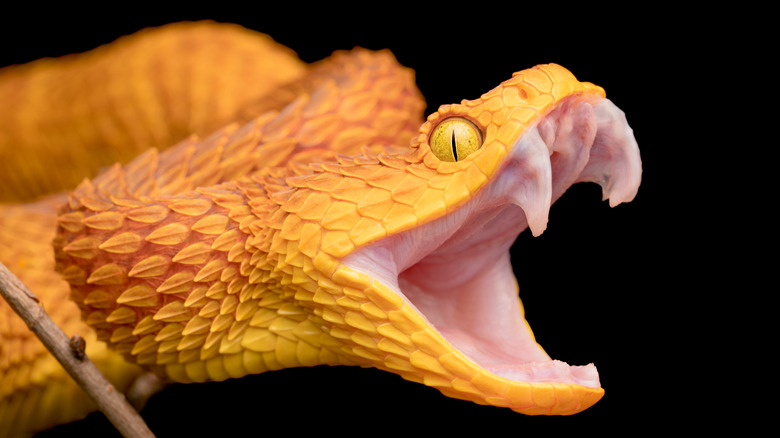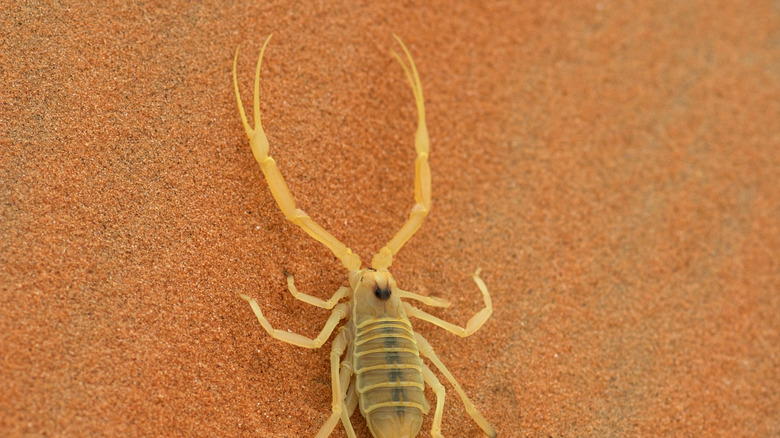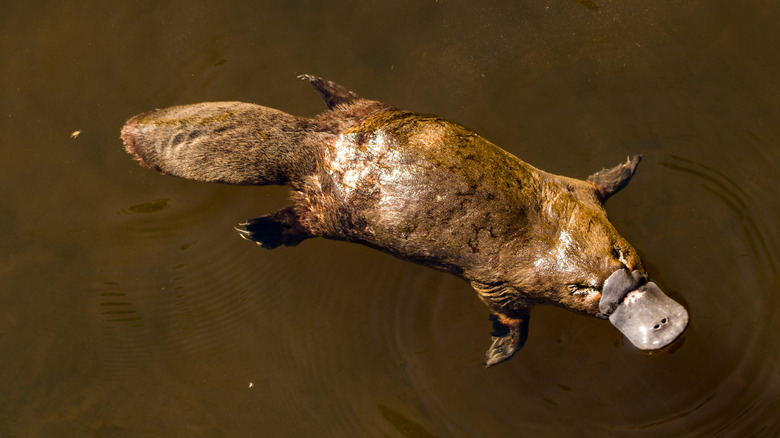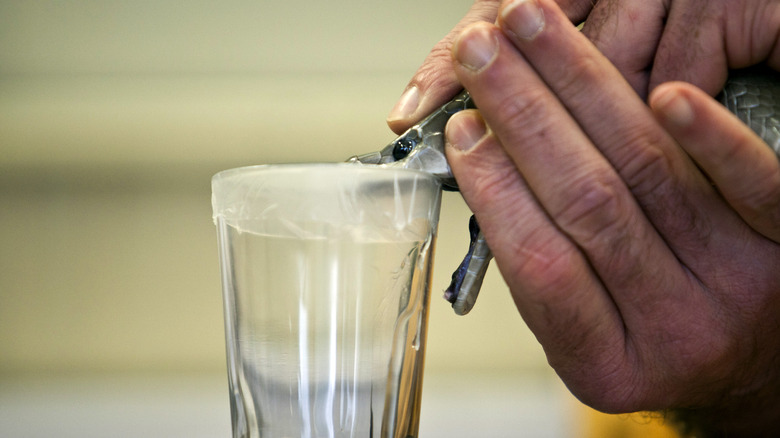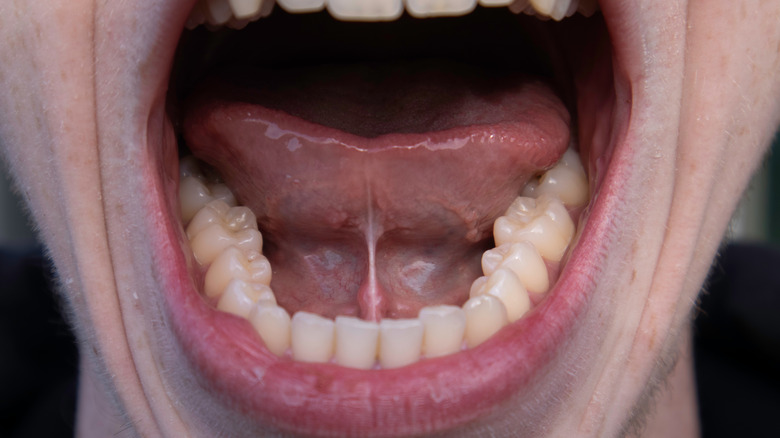Is Human Saliva Venomous?
Human saliva is a lot of things: wet, slimy, and, many people would say, gross. But did you know it could also potentially be venomous?
Composed primarily of water, saliva is one of the key fluids that ensures the body continues functioning, helping to protect your mouth from decay and allowing you to eat comfortably (via WebMD). In fact, your body generates as much as half a gallon of saliva a day (via Eufic), and not producing enough can lead to a host of problems, including cavities. Generated from blood plasma, saliva includes many different particles, including proteins and digestive enzymes (via Britannica). Saliva is not just produced by humans, either — other mammals and vertebrates also produce saliva, though the exact makeup of saliva can vary from animal to animal (via Innovative Veterinary Care). It's also worth noting that some vertebrates, including some aquatic vertebrates like whales, don't produce saliva (via Whales Online).
But saliva isn't just a lubricant to keep the body working — it can also be dangerous, and many different animals have venomous saliva (via National Geographic). What about humans?
Venomous animals
There are plenty of venomous animals out there in the world. From snakes to shrews, animals have developed venom to defend themselves, so it's important to be careful around animals with venom (via National Geographic). Some famously venomous animals include the platypus, which delivers a highly potent, though not deadly, venom; cone snails, whose venom can paralyze a victim and lead to drowning; and even, technically, mosquitos (via the Natural History Museum). Don't worry, mosquito "venom" isn't deadly, but it's still a fun excuse to complain. Next time you've got a mosquito bite that's bothering you, you can say you were bit by a venomous creature!
However, be sure not to mix up venomous and poisonous animals. Though venomous animals inject you with a toxic substance, poisonous animals disperse toxins through other methods (via National Geographic). That means poisonous animals don't need to bite you to injure you. In general, try to be careful about any animal labeled venomous or poisonous.
Why animals evolve venomous saliva
Though many different animals are venomous, they are not all venomous for the same reasons. That is to say, venom can provide different evolutionary advantages to different animals, depending on their environment, hunting style, and predators (via ScienceNordic). This is an example of convergent evolution, or evolution that occurs independently — i.e., each species develops its own mutations — but which leads to many species developing similar features (e.g., becoming venomous).
For instance, platypus venom is a tool of aggression, not defense (via the Natural History Museum). Rather than producing venom year-round, platypuses only need venom during the mating season, when they use it to beat other platypuses out for a mate. On the other hand, shrews use their venom to eat. By paralyzing their prey with their venom, they can trap them in one place and allow themselves a nice, leisurely dinner meal.
What is venom made of?
As you might imagine, because different species evolved venom differently, not all animals' venom is composed of the exact same things. For instance, each different species of snake has its own venom, and in fact, even within a species, different snakes can have different venom (via The Conversation). These venoms can contain different toxins as well as other basic physiological building blocks like carbohydrates, proteins, and amino acids (via the National Library of Medicine).
In order to treat venomous bites, specific antivenoms must be created for different species (via the Smithsonian Institution). Antivenom is created by taking a specific venom directly from the venomous animal and injecting it in very small quantities into another animal (via the University of Melbourne). Over time, the animal will build up antibodies that respond to the foreign intrusion of the venom. It's these antibodies that are used, in turn, to create an antivenom serum.
Is human saliva venomous?
Human saliva is not venomous. However, that doesn't mean it will never be venomous. Like any other animal, humans have the ability to evolve and change over time, and that includes the makeup of our saliva (via ScienceAlert). Over time, we, like other mammals, may develop venomous saliva — and, in fact, recent research suggests that this path is entirely possible.
According to a 2021 study, mammals have some similar genes to the venomous pit viper Habu (via Mashable Southeast Asia). These genes control the production of the snakes' venom, meaning that the presence of similar genes in humans and other mammals suggests the possibility that humans could one day develop their own venom. In fact, though different species have distinct venoms, there are certain elements of some toxins which are shared across different species, meaning humans could even theoretically develop a venom that is similar in some ways to pit viper venom.
Will humans ever develop venom?
All this begs the question: If it's possible for humans to develop the ability to secrete venom, will we? Though the scientific evidence suggests that this evolution is theoretically possible, most of the scientists behind the project have dubbed it unlikely, according to ScienceAlert. That's because humans don't actually have an evolutionary need for venom.
Though the exact reasons for evolving a venomous bite vary from animal to animal, most animals either use venom to defend themselves or use it to sedate prey (via ScienceNordic). With advanced weaponry and intelligence on our hands, most humans aren't in need of new or exciting ways to defend ourselves. And similarly, since most humans across the globe eat primarily livestock and foods that can be found in the refrigerated section of the grocery store, we don't exactly need to be sinking our fangs into our prey and delivering a dose of toxins to disable it. That means that it's unlikely humans will find themselves with venomous fangs any time soon — though really, that's likely for the best.
